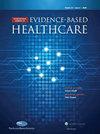慢性苯二氮卓类药物使用者苯二氮卓类药物停药的药物干预。
Q3 Medicine
International Journal of Evidence-Based Healthcare
Pub Date : 2019-06-01
DOI:10.1097/XEB.0000000000000161
引用次数: 9
摘要
本文章由计算机程序翻译,如有差异,请以英文原文为准。
Pharmacological interventions for benzodiazepine discontinuation in chronic benzodiazepine users.
Benzodiazepines are an effective pharmacological intervention for the management of insomnia and anxiety, and also the prevention and treatment of epileptic seizures. While benzodiazepines are indicated for the short-term management of such conditions, their use may become prolonged, leading to drug dependence in an individual. Individuals may deliberately abuse benzodiazepines, or inadvertently become dependent, physically and/or psychologically. Prescribers are, at present, encouraged to provide the lowest effective dose to individuals, limit prescribing benzodiazepines to 4 weeks of use or less and to consider the risks of dependency in the individual being prescribed for. Individuals who become dependent, chronic users of benzodiazepines may experience physical symptoms such as flu-like illness and muscular cramps, and also psychological symptoms such as irritability and insomnia. Often, the symptoms of withdrawal mimic the symptoms of the original complaint that the benzodiazepines were prescribed for, leading to an exaggerated effect of rebound symptoms. This complicates the discontinuation of benzodiazepines as individuals mistakenly believe there is a need for continued prescription. To assist individuals with discontinuing long-term use of benzodiazepines, gradual withdrawal, psychological support and pharmacological intervention are recommended. The Cochrane review aims to assess the benefits and harms of pharmacological interventions to facilitate discontinuation of chronic benzodiazepine use. The authors of this review examined whether pharmacological interventions may facilitate the discontinuation of benzodiazepines. Pharmacological interventions are centred on the symptomatic management of withdrawal; however, no drugs are, at present,
求助全文
通过发布文献求助,成功后即可免费获取论文全文。
去求助
来源期刊

International Journal of Evidence-Based Healthcare
Medicine-Health Policy
CiteScore
1.80
自引率
0.00%
发文量
39
期刊介绍:
The International Journal of Evidence-Based Healthcare is the official journal of the Joanna Briggs Institute. It is a fully refereed journal that publishes manuscripts relating to evidence-based medicine and evidence-based practice. It publishes papers containing reliable evidence to assist health professionals in their evaluation and decision-making, and to inform health professionals, students and researchers of outcomes, debates and developments in evidence-based medicine and healthcare.
The journal provides a unique home for publication of systematic reviews (quantitative, qualitative, mixed methods, economic, scoping and prevalence) and implementation projects including the synthesis, transfer and utilisation of evidence in clinical practice. Original scholarly work relating to the synthesis (translation science), transfer (distribution) and utilization (implementation science and evaluation) of evidence to inform multidisciplinary healthcare practice is considered for publication. The journal also publishes original scholarly commentary pieces relating to the generation and synthesis of evidence for practice and quality improvement, the use and evaluation of evidence in practice, and the process of conducting systematic reviews (methodology) which covers quantitative, qualitative, mixed methods, economic, scoping and prevalence methods. In addition, the journal’s content includes implementation projects including the transfer and utilisation of evidence in clinical practice as well as providing a forum for the debate of issues surrounding evidence-based healthcare.
 求助内容:
求助内容: 应助结果提醒方式:
应助结果提醒方式:


